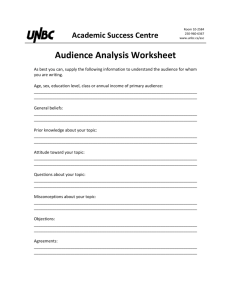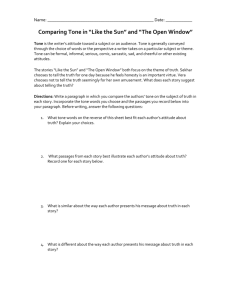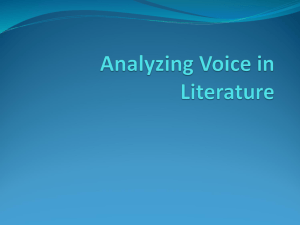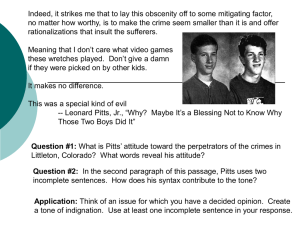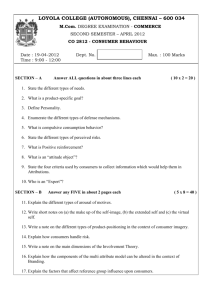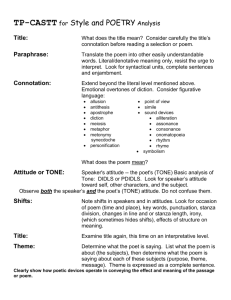Tone Analysis Practice: AP English Lit Worksheet
advertisement
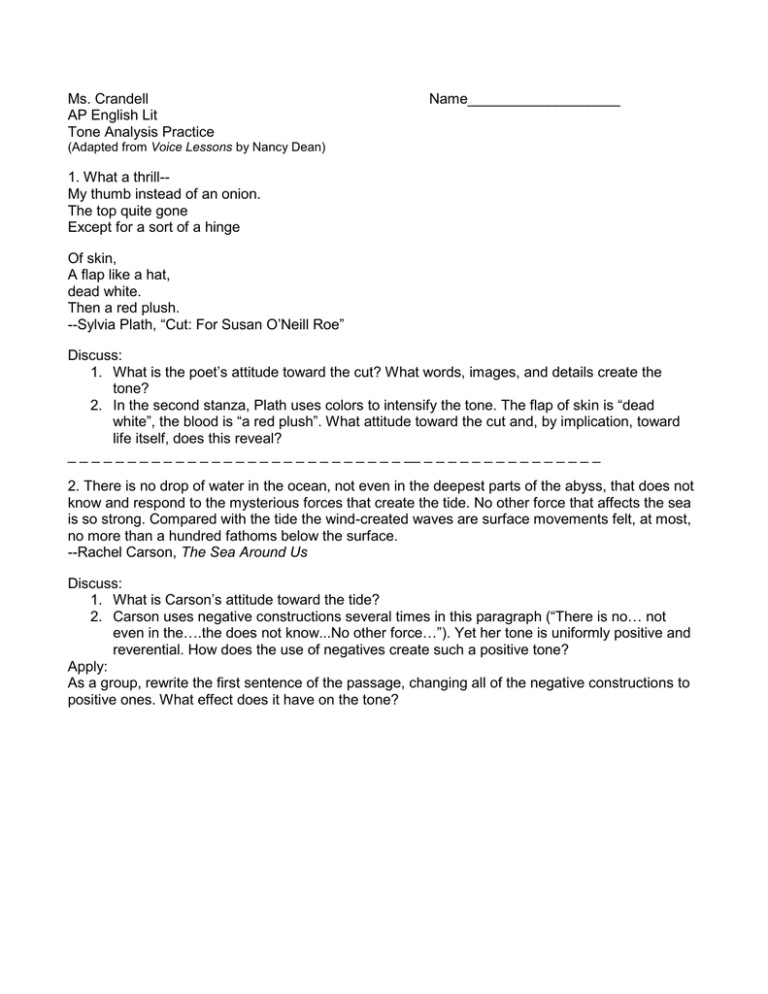
Ms. Crandell AP English Lit Tone Analysis Practice Name___________________ (Adapted from Voice Lessons by Nancy Dean) 1. What a thrill-My thumb instead of an onion. The top quite gone Except for a sort of a hinge Of skin, A flap like a hat, dead white. Then a red plush. --Sylvia Plath, “Cut: For Susan O’Neill Roe” Discuss: 1. What is the poet’s attitude toward the cut? What words, images, and details create the tone? 2. In the second stanza, Plath uses colors to intensify the tone. The flap of skin is “dead white”, the blood is “a red plush”. What attitude toward the cut and, by implication, toward life itself, does this reveal? _ _ _ _ _ _ _ _ _ _ _ _ _ _ _ _ _ _ _ _ _ _ _ _ _ _ _ _ __ _ _ _ _ _ _ _ _ _ _ _ _ _ _ _ 2. There is no drop of water in the ocean, not even in the deepest parts of the abyss, that does not know and respond to the mysterious forces that create the tide. No other force that affects the sea is so strong. Compared with the tide the wind-created waves are surface movements felt, at most, no more than a hundred fathoms below the surface. --Rachel Carson, The Sea Around Us Discuss: 1. What is Carson’s attitude toward the tide? 2. Carson uses negative constructions several times in this paragraph (“There is no… not even in the….the does not know...No other force…”). Yet her tone is uniformly positive and reverential. How does the use of negatives create such a positive tone? Apply: As a group, rewrite the first sentence of the passage, changing all of the negative constructions to positive ones. What effect does it have on the tone? 3. I can’t forget How she stood at the top of that long marble stair Amazed, and then with a sleepy pirouette Went dancing slowly down to the fountain-quieted square; Nothing upon her face But some impersonal loneliness, --not then a girl, But as it were a reverie of the place, A called-for falling glide and whirl; As when a leaf, petal, or thin chip Is drawn to the falls of a pool and, circling a moment above it, Rides on over the lip-Perfectly beautiful, perfectly ignorant of it. --Richard Wilbur, “Piazza Di Spagna, Early Morning” Discuss: 1. What is the speaker’s attitude toward the woman he describes? List the images, diction, and details that support your position. 2. Consider the last line of the poem. How does the repetition of the syntactical structure (adverb adjective, adverb adjective) support the tone of the poem? Apply: Using Wilbur’s poem as a model, write a sentence that expresses stunned admiration for a stranger. Use repetition of syntactical structure to create your tone. _______________________________________________ 4. In Pride, in reasoning Pride, our error lies; All quit their sphere, and rush into the skies. Pride still is aiming at the best abodes, Men would be Angels, Angels would be Gods. Aspiring to be Gods, if Angels fell, Aspiring to be Angels, Men rebel: And who but wishes to invert the laws Of Order, sins against th’ Eternal Cause. --Alexander Pope, “An Essay on Man” Discuss: 1. What is Pope’s attitude toward pride, the subject matter? Cite your evidence. 2. What is the tone of this passage? Apply: Write a short paragraph on the art of essay writing. Show through your diction and choice of detail that you believe yourself superior in every way to your reader. Never directly state your superiority; instead, let the tone of your paragraph carry your haughty attitude. 5. JACK (slowly and hesitantly): Gwendolen -- Cecily -- it is very painful for me to be forced to speak the truth. It is the first time in my life that I have ever been reduced to such a painful position, and I am really quite inexperienced in doing anything of the kind. However I will tell you quite frankly that I have no brother Ernest. I have no brother at all. I never had a brother in my life, and I certainly have not the smallest intention of ever having one in the future. --Oscar Wilde, The Importance of Being Ernest Discuss: 1. What is Wilde’s attitude toward Jack? What specific diction and detail reveal this attitude? 2. What is Wilde’s attitude toward the reader? How do you know? Apply: Rewrite Jack’s lines to reflect the attitude that lying is terribly wrong. Adopt a disdainful attitude toward your audience and a scornful attitude toward Jack.
